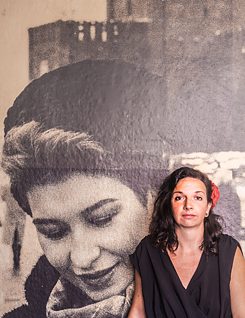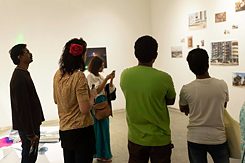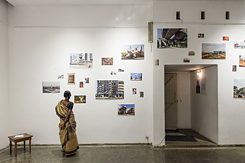Laura Fiorio
bangaloREsident@MOD Institute
In her freelance artistic work, the photographer Laura Fiorio (*1985, Verona, Italy) focuses on inhabited landscape and its transformation, with a particular interest in the topic of housing, human geography and personal archives, where private space becomes a mirror for the wider public environment.
Her approach through photography is an interest in public art and the role of photography as a vehicle for change. Her projects address transition, gentrification, displacement of people and spaces – both of local and of global importance while focusing on everyday life, developing collective and participatory projects in which observation escalates into interactive performances. With confidence in the power of photography, in its ability to communicate and as a tool for connection, discovery and reflection, her work is often concerned with social and educational matters.
After studying Performing Arts, Visual Communication and New Media Arts at the IUAV and the Academy of Fine Arts in Venice 2010 and Film and Interactive Media at Middlesex University in London 2009, Fiorio started her professional career in the film and photography production between Berlin and Venice where she lives and works today. As freelance documentary photographer, Fiorio worked for museums and cultural institutions like Haus der Kulturen der Welt, ZKU, Venice Biennale, as well as a production assistant for well-known artists and researchers like Francesco Jodice, Armin Linke, Elmgreen & Dragset.
In 2015 she received a Masters in Art and Social Work at Alice Salomon Hochschule in Berlin, through which she started working in educational multimedia projects in prison, refugee camps and homeless shelters.
One of her long term research projects «La border curios» which is about postcolonial cities was realised in Tijuana in 2017 thanks to a residency supported by the Goethe-Institut and Relaciones Inesperadas. The project focuses particularly on the topic of border and migration, working together with students and deported people. «La border curios» states that borders are fictional geographical divisions between lands and nations are just human creations that aim for division rather than inclusion. The project underlined this mutability along with the absurdity of the notion, which was explored by vacillating between the line of what is documentary and what fictional.
In Bangalore, she will work with the MOD Institute on local strategies of living and conceiving the urban and common space in a postcolonial city which is expanding and developing fast, researching and collecting images from private archives and working with locals and passers-by to create a common archive of everyday life in a specific neigbourhood.


